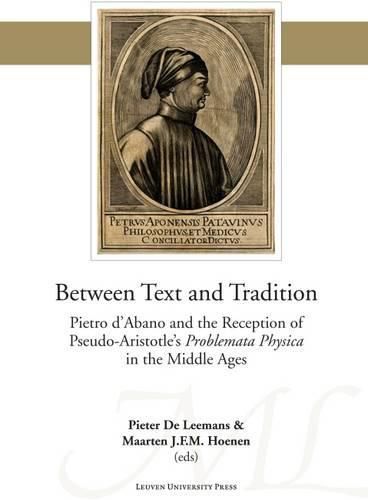Readings Newsletter
Become a Readings Member to make your shopping experience even easier.
Sign in or sign up for free!
You’re not far away from qualifying for FREE standard shipping within Australia
You’ve qualified for FREE standard shipping within Australia
The cart is loading…






This title is printed to order. This book may have been self-published. If so, we cannot guarantee the quality of the content. In the main most books will have gone through the editing process however some may not. We therefore suggest that you be aware of this before ordering this book. If in doubt check either the author or publisher’s details as we are unable to accept any returns unless they are faulty. Please contact us if you have any questions.
New insights into Pietro d'Abano's unique approach to translations.
The commentary of the Italian physician and philosopher Pietro d'Abano on Bartholomew of Messina's Latin translation of Pseudo-Aristotle's Problemata Physica, published in 1310, constitutes an important historical source. In a section of the corpus Aristotelicum that was not part of the standard curriculum at the medieval university, the commentary of Pietro d'Abano investigates the complex relationship between text, translation, and commentary. The eight articles in this volume provide valuable insights into the manner in which Pietro d'Abano deals with the problems of a translated text. They emphasize the idiosyncrasy of his approach in comparison to his contemporaries and successors, the particularities of his commentary in light of the habitual exegetical practices applied in the teaching of curricular texts, as well as the influence of philosophical traditions outside the strict framework of the medieval arts faculty.
This publication is GPRC-labeled (Guaranteed Peer-Reviewed Content).
Contributors : Joan Cadden (University of California, Davis), Gijs Coucke (KU Leuven), Beatrice Delaurenti (Ecole des Hautes Etudes et Sciences Sociales - Paris), Pieter De Leemans (KU Leuven), Francoise Guichard-Tesson (KU Leuven), Danielle Jacquart (Ecole Pratique des Hautes Etudes - Paris), Christian Meyer (Centre d'Etudes superieures de la Renaissance - Tours), Iolanda Ventura (CNRS - Universite d'Orleans)
$9.00 standard shipping within Australia
FREE standard shipping within Australia for orders over $100.00
Express & International shipping calculated at checkout
Stock availability can be subject to change without notice. We recommend calling the shop or contacting our online team to check availability of low stock items. Please see our Shopping Online page for more details.
This title is printed to order. This book may have been self-published. If so, we cannot guarantee the quality of the content. In the main most books will have gone through the editing process however some may not. We therefore suggest that you be aware of this before ordering this book. If in doubt check either the author or publisher’s details as we are unable to accept any returns unless they are faulty. Please contact us if you have any questions.
New insights into Pietro d'Abano's unique approach to translations.
The commentary of the Italian physician and philosopher Pietro d'Abano on Bartholomew of Messina's Latin translation of Pseudo-Aristotle's Problemata Physica, published in 1310, constitutes an important historical source. In a section of the corpus Aristotelicum that was not part of the standard curriculum at the medieval university, the commentary of Pietro d'Abano investigates the complex relationship between text, translation, and commentary. The eight articles in this volume provide valuable insights into the manner in which Pietro d'Abano deals with the problems of a translated text. They emphasize the idiosyncrasy of his approach in comparison to his contemporaries and successors, the particularities of his commentary in light of the habitual exegetical practices applied in the teaching of curricular texts, as well as the influence of philosophical traditions outside the strict framework of the medieval arts faculty.
This publication is GPRC-labeled (Guaranteed Peer-Reviewed Content).
Contributors : Joan Cadden (University of California, Davis), Gijs Coucke (KU Leuven), Beatrice Delaurenti (Ecole des Hautes Etudes et Sciences Sociales - Paris), Pieter De Leemans (KU Leuven), Francoise Guichard-Tesson (KU Leuven), Danielle Jacquart (Ecole Pratique des Hautes Etudes - Paris), Christian Meyer (Centre d'Etudes superieures de la Renaissance - Tours), Iolanda Ventura (CNRS - Universite d'Orleans)